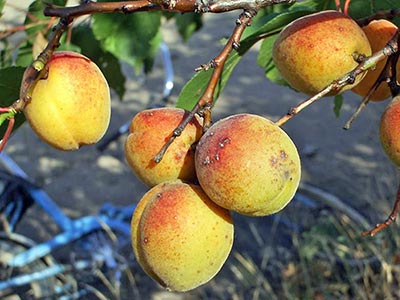WHAT IS JOY? — Fruit of the Spirit — Part2
¿Qué Es El Gozo? — Fruto del Espíritu — Parte 2
by
Mary Hunt Webb
Posted Friday, June 30, 2017

The presence of fruit indicates that the tree is alive and that growth is taking place. [Photographer: Berdnik Oleksander. Photo courtesy of Stockvault.net.]
While summer may bring high temperatures, one of its compensations is the abundance of fruit. Although we may buy these delights of the summer season at the supermarket or at a produce stand, homegrown fruit tells us the kind of tree that is growing in the garden. Fruit also indicates that the tree is alive and that growth is taking place.
That idea of vitality and growth is behind the reference to the Fruit of the Spirit in Galatians 5:22-23: "22) But the Holy Spirit produces this kind of fruit in our lives: love, joy, peace, patience, kindness, goodness, faithfulness, 23) gentleness, and self-control. There is no law against these things." (New Living Translation) The presence of the Holy Spirit within us is evident because of the nine qualities named in these two verses. Unlike earthly trees that produce edibles, the Holy Spirit produces fruit that is visible through the behavior of each individual.
Earlier this year, we wrote about the first of these fruits: love. (See "Fruit of the Spirit", January 31, 2017) At that time, we defined "joy" as "a sense of well-being and gladness." During the months that have followed, we have had the opportunity to look more closely at exactly what "joy" means.
In my research, I learned that "gladness" refers to elation or high spirits and encompasses both "happiness" and "joy". While some may confuse "happiness" with "joy", a close examination reveals that there is a difference between the two.
"Happiness" is a temporary emotion related to personal earthly experiences, outward circumstances, or material objects that frequently pertain to one's self. For example, eating something pleasurable or obtaining a desired object may result in happiness of a temporary nature, but that feeling of gratification does not last long. It is superficial and is easily replaced by other desires.

Eating a tasty dessert may bring temporary happiness but that feeling only lasts until the next tempting treat comes along. [Photographer: Alexander Mils. Photo courtesy of Stocksnap.io.]
By contrast, "joy" is a more lasting emotion that is often connected in some way to others. For example, we can feel joy at the achievement of others. When a student called to tell me that he had passed the high school equivalency exam on his fifth attempt at it, I felt joy because I knew that he had studied a long time and that it had not been easy for him. If he had been my own son, that feeling could have been interpreted as pride, but since he was not related to me, it was properly defined as joy.
Similarly, when the apostle, John, wrote to those he had mentored, he said, "I have no greater joy than to hear that my children walk in truth." (3 John 1:4, New King James Version) Those of whom he spoke were not his biological children but his spiritual offspring that he had taught. Thus, his joy was connected to their spiritual well-being rather than to some earthly condition, situation, or object.
Unlike happiness, joy does not have to be connected to a specific event, experience, or acquisition. We can feel joy at existing conditions, such as experiencing a beautiful day or having a healthy child. Therefore, joy is more apt to be related to the heart.

Joy is a deep, inner feeling of contentment that is not dependent on outward circumstances. It can even be felt in the midst of conflict. [Photographer: Skeeze. Photo courtesy of Pixabay.com.]
As odd as it seems, it is even possible to feel joy in the midst of conflict. That is because joy is not dependent on outward circumstances but is more deeply rooted. James, the brother of Jesus, advised believers to recognize that difficulties build faith that produces patience and is, therefore, a cause for joy. He wrote, "2) My brethren, count it all joy when you fall into various trials, 3) knowing that the testing of your faith produces patience." (James 1:2-3, New King James Version)
This ability to experience joy in difficult circumstances indicates that joy has a stronger foundation than mere happiness. For Christians, that foundation is Jesus. It has been said that, in English, at least, the word "joy" can be viewed as an acronym: J.O.Y. = Jesus, Others, You. He is the Source of our joy so that it does not evaporate as a result of conflict, problems, or disappointment. Instead, our joy indicates the presence of the Holy Spirit within us.
I can think of no better way to finish this insight into "joy" than with Romans 15:13 — "Now may the God of hope fill you with all joy and peace in believing, that you may abound in hope by the power of the Holy Spirit." (New King James Version)
BIBLE VERSES FOR THIS POSTING
Galatians 5:22-23 — 22) But the Holy Spirit produces this kind of fruit in our lives: love, joy, peace, patience, kindness, goodness, faithfulness, 23) gentleness, and self-control. There is no law against these things. (New Living Translation)
Gálatas 5:22-23 — 22) Mas el fruto del Espíritu es amor, gozo, paz paciencia, benignidad, bondad, fe, 23) mansedumbre, templanza; contra tales cosas no hay ley. (Reina-Valera 1960)
John 1:4 — I have no greater joy than to hear that my children walk in truth. (New King James Version)
3 Juan 4 — 4) No tengo yo mayor gozo que este, el oír que mis hijos andan en la verdad. (Reina-Valera 1960)
James 1:2-3 — 2) My brethren, count it all joy when you fall into various trials, 3) knowing that the testing of your faith produces patience. (New King James Version)
Santiago 1:2-3 — 2) Hermanos míos, tened por sumo gozo cuando os halléis en diversas pruebas., sabiendo que la prueba de vuestro fe produce paciencia. (Reina-Valera 1960)
Romans 15:13 — Now may the God of hope fill you with all joy and peace in believing, that you may abound in hope by the power of the Holy Spirit. (New King James Version)
Romanos 15:13 — Y el Dios de esperanza os llene de todo gozo y paz en el creer, para que abundáis en esperanza por el poder del Espíritu Santo. (Reina-Valera 1960)

Joy is a strong emotion that is not necessarily related to some earthly condition, situation, or object but is often connected to others in some way. [Photographer: Jack Moreh. Photo courtesy of Stockvault.net.]
